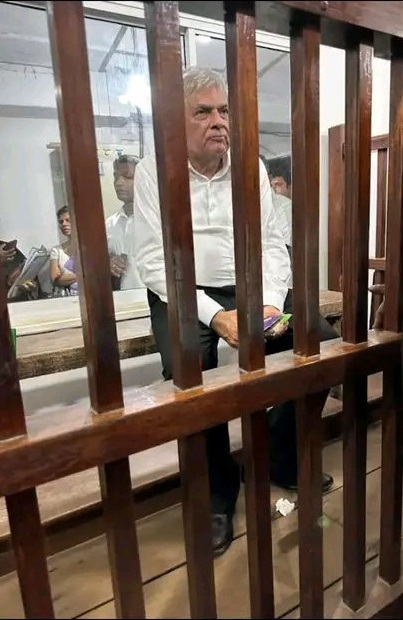-By Sam Dharmapala

(Lanka-e-News -01.Sep.2025, 11.00 PM) Former Sri Lankan President Ranil Wickremesinghe, once hailed as the consummate political survivor, finds himself facing one of the gravest crises of his career. Accused of misappropriating public funds during his tenure, he was arrested last month and remanded in custody for four days. In practice, his time on remand was spent not behind prison walls but within the intensive care unit of Colombo National Hospital, following claims of deteriorating health.
The sight of Wickremesinghe in custody has startled the political class in Colombo. Why him, and why now? For two decades, Mahinda Rajapaksa and Gotabaya Rajapaksa faced allegations ranging from corruption to complicity in political killings, yet neither was ever placed behind bars. Wickremesinghe, by contrast, seemed to have fallen with unusual speed.
The governing National People’s Power (NPP) administration of President Anura Kumara Dissanayake insists that Wickremesinghe’s detention is part of a broader crackdown on entrenched corruption and financial malpractice. His arrest, they argue, demonstrates the government’s determination to act against the abuse of state resources, irrespective of status.
The opposition, led by Sajith Premadasa, claims the opposite: that the arrest is nothing more than political vendetta, an attempt to crush dissent and edge Sri Lanka towards what they call “constitutional authoritarianism.”
Social media has since become a battlefield between the two camps. Yet, behind the partisan fury, Indian political analysts have advanced a far more intriguing explanation: Wickremesinghe’s downfall, they suggest, is linked not merely to domestic corruption but to his alleged dabbling in Indian politics.
According to these commentators, Wickremesinghe, along with former foreign minister Ali Sabry and former high commissioner Milinda Moragoda, engaged in behind-the-scenes manoeuvres that caught the attention—and ire—of New Delhi.
At the centre of the storm lies Shashi Tharoor, the Congress parliamentarian for Thiruvananthapuram and a seasoned diplomat-turned-politician. Within India’s opposition, a quiet debate has been taking shape: if Rahul Gandhi cannot unite the opposition against Narendra Modi, should another candidate be floated? Some have rallied behind West Bengal Chief Minister Mamata Banerjee. Others have placed their hopes in Tharoor, a former UN under-secretary-general, writer, and one-time candidate for Secretary-General of the United Nations.
It was Wickremesinghe, Moragoda, and Sabry, according to Indian analysts, who became key players in early discussions about positioning Tharoor as a prime ministerial challenger. The trio, leveraging Colombo’s diplomatic and regional networks, were reported to have met Tharoor privately at a Colombo hotel. Discussions reportedly covered not only Indian opposition strategy but also the state of Sri Lanka’s new government under Dissanayake.
Within days of that meeting, Sri Lanka’s Criminal Investigation Department issued a summons to Wickremesinghe. By 21 August, he was in custody.
Was his arrest coincidental? Few in Colombo think so. Observers note the deepening ties between Modi’s BJP government and Dissanayake’s NPP administration. Against such a backdrop, the suggestion that Sri Lankan opposition figures might be meddling in Indian opposition politics was unlikely to go unanswered.
For Modi’s government, say Indian commentators, Wickremesinghe and his allies were treading on dangerous ground—attempting to weaken the “strategic convergence” now binding New Delhi and Colombo. Dr Harsha de Silva of the opposition Samagi Jana Balawegaya, for instance, has already criticised the closeness of the two governments, but Wickremesinghe’s alleged role in facilitating Tharoor’s campaign crossed into outright interference.
Tharoor is, of course, no stranger to controversy. A bestselling author and fluent English orator, he came second in the UN Secretary-General race in 2006. In 2014, he was thrust into scandal following the mysterious death of his third wife, Sunanda Pushkar, in a Delhi hotel room. India’s Hindu nationalist establishment has long viewed him with suspicion, branding him a Westernised intellectual. Yet his erudition and cosmopolitan style make him an appealing alternative candidate for many in Congress.
For Wickremesinghe and Moragoda, supporting Tharoor could also have had strategic dividends: a sympathetic Indian prime minister might ease their own ambitions. Sources suggest Moragoda, once derided in Colombo as “a Western agent,” has been quietly advancing plans to put himself forward as a potential joint opposition candidate in Sri Lanka’s next presidential election. His dream, say associates, is to secure Wickremesinghe a senior diplomatic posting—perhaps within the UN or another Asian multilateral body—with Tharoor’s assistance.
But such dreams now look remote. It is difficult to imagine any Sri Lankan politician accused of misusing public funds being elevated to a position of international leadership.
Ranil Wickremesinghe has long been described as Sri Lanka’s consummate strategist—a man who, though never fully trusted, always found a way back into power. He became president almost by accident, after Gotabaya Rajapaksa fled in 2022, but wore the crown, however briefly, as though fate had finally rewarded his persistence.
Yet history rarely repeats itself. Those close to him still insist he may one day return to the presidency. But to critics, his latest fall is a cautionary tale: the political tactician who mistook his proximity to power for immunity, and who reached too far, beyond his country’s borders, into India’s own turbulent politics.
As one Indian analyst remarked with a proverb: the squirrel that tries to leap too many branches risks falling. Wickremesinghe’s arrest, they argue, marks precisely such a fall—a moment of overreach, born of a failure to respect the limits imposed by Sri Lanka’s powerful neighbour.
-By Sam Dharmapala
---------------------------
by (2025-09-01 21:16:32)
Leave a Reply